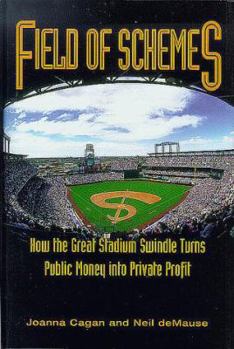Field of Schemes: How the Great Stadium Swindle Turns Public Money Into Private Profit
Select Format
Select Condition 
Book Overview
Are you a sports fan distraught over seeing your home team move to another city? Or a happy sports fan whose city has just lured that team to your home turf with a brand new stadium? Or maybe you... This description may be from another edition of this product.
Format:Paperback
Language:English
ISBN:1567511384
ISBN13:9781567511383
Release Date:July 2002
Publisher:Common Courage Press
Length:272 Pages
Weight:0.64 lbs.
Dimensions:0.7" x 5.0" x 7.6"
Customer Reviews
5 ratings
Trenchant analysis of a troubling phenomenon
Published by Thriftbooks.com User , 22 years ago
"Field of Schemes" is an accessible but no less incisive critique of an often overlooked aspect of the corporate welfare phenomenon: professional sports team owners and the seemingly insatiable lust for obtaining ever-more-lavish stadiums to be built at public expense. Sports fans Joanna Cagan and Neil deMause combine original and secondary research with interviews to successfully chronicle and analyse the public stadium building boom in an entertaining yet thought-provoking manner.Cagan and deMause paint a picture of a playing field that is decidedly not even. Local communities are pitted in a struggle against powerful coalitions of wealthy sports moguls, politicos, real estate developers and other related businesspeople (which oftentimes includes the local media, since sports helps sells newspapers and TV advertising) over the allocation of increasingly scarce public tax revenues. The authors show that public education in particular seems to bear the brunt of the burden whenever the community loses the fight and sees its funds siphoned away to build these private sports palaces.Cagan and deMause detail specific cases where owners have successfully blackmailed communities and strong-armed local politicians. These case studies reveal a formula that the authors term "the art of the steal", a step-by-step game plan for owners who plan to fleece their communities for free sports structures. Shamelessly exploiting the community's emotional attachments to the home team and ruthlessly working the good-ole-boy business networks to which local politicians are beholden are a few of the key ingredients that helps to make these schemes work, the authors claim. Cagan and deMause interview individuals associated with a few of the grass-roots organizations that sprung up to oppose various stadium initiatives. While such groups often experience initial success, they are usually overwhelmed in the long run by the persistence of the powerful forces lined up against them. Citing numerous opinion polls and voter referendums where citizens strenuously opposed the use of tax dollars to fund privately-owned stadiums, the authors suggest that the reason owners win more often than not is due to the greater political power at their disposal, and not the democratic process.Indeed, the cost to society as a whole is often great. In Chapter 8, "Bad Neigbors", Cagan and deMause brilliantly relate baseball's current preoccupation with the recreation of a mythic past (through the construction of "old time" ballparks such as Camden Yards in Baltimore) with the real decay of America's inner cities. The authors discover that many urban centers have actually been subjected to a corporate "structural adjustment" program akin to those experienced in many Third World nations. They contend that a core problem is a system of private enterprise that privileges the profit motive at the expense of ordinary people.The authors wrap up the book by alluding to signs that the public stadium-bui
Whose money is it anyway?
Published by Thriftbooks.com User , 25 years ago
If you thought you had to have a stadium and you had to pay for it, read this before you vote. Wonderfully documented and thouroughly researched. I knew we all were getting screwed but until I read this book I didn't know how bad it could hurt. A good primer on the language of stadium larceny.
Read this book before you vote on the next bond issue!
Published by Thriftbooks.com User , 26 years ago
As a life-long resident of the Detroit area, I know this tale all too well. It is one of lies, cheating, embezzlement, and ultimately disappointment.Right now there are two huge holes in downtown Detroit. Any day now, we'll begin filling them with our tax dollars so they can fail to end the years of decay this city has undergone. It's possible that if anyone had cared to study the history of this practice, like deMause and Cagan have, we could have avoided this whole mess.Maybe another team can keep its Tiger Stadium because of this book.
Well-researched & well-written; dirt on pols & media, too.
Published by Thriftbooks.com User , 26 years ago
I like sports a lot and thought I wouldn't enjoy this book. Before reading Field of Schemes, I thought it would bore me with trivial facts and numbers and I thought corporate welfare to the sports industry was the least of America's worries. I was very wrong. The authors have exposed some of the deepest current urban conspiracies between newspaper owners, local politicians and real estate developers. I know a lot about politics, economics, urban development and corporate welfare, but I was amazed at what I learned from Field of Schemes. And everything is irrefutably documented. This is one of the last books the "powers that be" want people to read. Read it. Every concerned citizen or activist in the US needs to know what is in this book.
What a rip-off! And I ain't talking about the book!
Published by Thriftbooks.com User , 26 years ago
deMause and Cagan take us on a roller-coaster ride through the zany and malfeasant antics of baseball team owners, particularly corporate ones. Your town is probably covered, and you're probably getting screwed. I'm not much of a sports fan, but I was nonetheless riveted by the lurid tales of how my money ends up in the pockets of the already super-rich.





